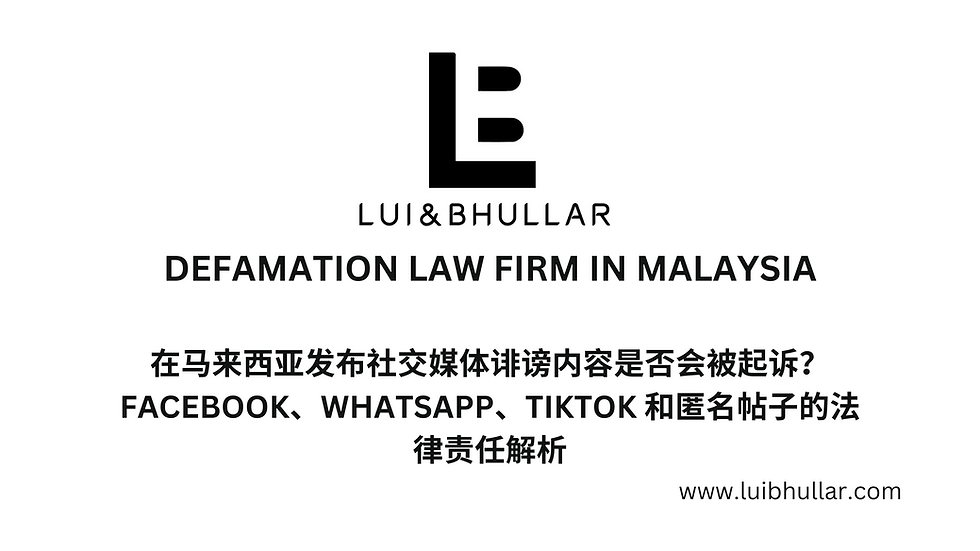Workplace Defamation Case in Malaysia: Rohana Ibrahim v. Khadijah Iskandar
- Messrs Lui & Bhullar
- Jul 3, 2025
- 2 min read
Updated: Oct 15, 2025
By Messrs Lui Bhullar

Defamation Case in Malaysia: Rohana Ibrahim v. Khadijah Iskandar
High Court Shah Alam | BA-23NCVC-67-12-2021 | Judgment Date: 31 January 2025
In a significant judgment under defamation law in Malaysia, the High Court ruled in favour of Rohana Ibrahim, awarding her RM30,000 in general and aggravated damages for defamatory remarks made by her former superior, Khadijah Iskandar, during a recorded MS Teams meeting at Agrobank.
Background
Rohana Ibrahim, a long-serving Relationship Manager at Agrobank, sued Khadijah Iskandar, who was then the acting CEO, for defamation arising from derogatory statements in a meeting recorded and later leaked. The video, initially stored on Agrobank’s public server, was eventually disseminated via WhatsApp, sparking public interest due to its controversial content.
Defamatory Statements and Their Impact
The defamatory remarks included innuendos that the plaintiff was professionally incompetent and insinuated that she conducted herself like a "GRO" (Guest Relations Officer)—a term with immoral and sexual undertones in Malaysian context. The court held that these words amounted to libel, having been recorded and circulated in a permanent form.
Justice Elaine Yap ruled that the statements lowered the plaintiff’s reputation among right-thinking members of society, particularly within Agrobank. The court found that the defamatory imputations ridiculed the plaintiff’s capability and moral character, thereby constituting actionable defamation under Section 5 of the Defamation Act 1957.
Legal Analysis
The Court emphasized that even brief defamatory statements can cause significant reputational harm, especially when recorded in a professional setting. Despite the defendant’s claim that “GRO” referred to "Government Relations Officer", the court found this explanation baseless, noting that the term commonly implies sexual connotations in local slang.
While the re-publication of the video via WhatsApp was deemed a separate act for which the defendant was not legally liable, the original publication on Agrobank’s server was sufficient for liability. The court underscored that there is no expectation of privacy in recorded official meetings at the workplace.
Legal Significance
This ruling sets a precedent in Malaysian libel cases involving workplace communication and digital recordings. It affirms that malicious statements made in meetings, even if initially private, can form the basis of defamation damages if published or circulated widely.
Need Legal Advice on Workplace Defamation?
If you're unsure how to sue for defamation in Malaysia or need to identify the person behind defamatory online content, consult our legal team today. At Messrs Lui & Bhullar, we combine strong legal strategy with digital expertise to hold online defamers accountable.
📧 Email: general@luibhullar.com
📞 WhatsApp: +60143000970




Comments